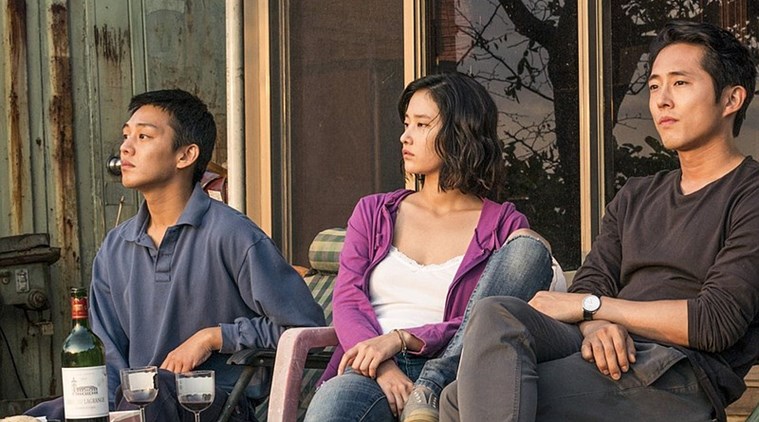
The two movies that I watched on the second day of the ongoing 11th edition of Bengaluru International Film Festival, has a few things in common: chopsticks, noodles and nuanced storytelling. Lee Chang-dong’s Burning and Hirokazu Kore-eda’s Shoplifters also highlight the rapidly growing socioeconomic inequality and its far-reaching implications in South Korea and Japan, respectively.
Burning is a slow-burning thriller whose genre is difficult to define until the film enters its unsettling third act. The film centres on three youngsters representing different strata of South Korea’s cosmopolitan and rural lifestyle. Shin Hae-mi (an awe-inspiring Jeon Jong-seo) is living alone in a tiny apartment overlooking iconic Seoul’s Namsan Tower. She has piling credit card bills and no steady job to support herself. She runs into her childhood neighbour Lee Jong-su (a brilliant Yoo Ah-in) and goes on a date with him. Over a couple of cheap bottles of beer, she explains to Jong-su the difference between “Little Hunger” and the “Great Hunger.” The former signifies emptiness of stomach and the latter the emptiness of life. She has been on a “Great Hunger” for quite some time now i.e. seeking the meaning of her life.
Hae-mi’s philosophical pursuit even takes her to Africa. Yes, she is cash-strapped but is still living her life on her terms. She asks Jong-su to feed her cat, Boil, when she is away and invites him to her room to introduce him to her pet. The couple’s second encounter turns erotic. Naturally, Hong-su ends up believing that he is in love with Hae-mi. But, it is sort of clear that she is not expecting anything more from Jong-su beyond petting her cat in her stead.
Jong-su returns to his property in Paju that is near the North Korean border. The house is unkempt, depleted, bears an abandoned look, reflecting the life of its young owner. Jong-su’s mother left him when he was young as she was unable to put up with his father’s anger issues. His father is now facing trial in an assault case, leaving him on his own to make sense of everything that Is happening around him. He is lost and unlike Hae-mi, he is not interested in asking existential questions about himself. All he craves for is the human connection and someone to care for him, a luxury which has eluded him since his childhood. Fear not, now he has Hae-mi to fill the void in his life, right? Apparently not.
Enter, Ben (a smouldering Steven Yeun). Hae-mi returns to her country from Africa with her new friend, Ben, the opposite of Jong-su. He is well-groomed, and above all, he is filthy rich. You can almost sense Jong-su’s heart sink when he sees his romantic rival for the first time. Ben’s very presence humbles and emasculates Jong-su. It is mainly because he knows his beat-up pick-up truck is no match to Ben’s sleek-looking Porsche. Jong-su’s fear of losing Hae-mi to a ‘Crazy Rich Asian’ strikes him like a bolt of thunder.
Ben himself suffers from god-complex. He believes everything under the sun, girls included, is his. “I am doing very well. Thanks to my superior DNA,” Ben tells his mother, who is on the other side of the phone with him. In spite of his composed and warm nature on the surface, we can sense that something is really off about him.
So it’s a love triangle, where a nice guy loses his love to the rich guy? That’s not it.
In a way, Burning is more about what you don’t see than what you can see. The wealth inequality, joblessness and rapidly changing world have ravaged the lives of people. Everyone is so pre-occupied with just making it through the day that they have no room to worry about their own people. Hae-mi’s family is totally unconcerned about her well-being or her whereabouts because they fear her unpaid credit cards bills. Jong-su touches himself every time he goes to Hae-mi’s room to feed her cat. It is his way of expressing his frustration about not having anything to do better.
Ben is just a few years older than Hae-mi and Jong-su, and he lives a life of excess. To put in Jong-su’s words, Ben is a Great Gatsby-sque guy. Cinematographer Hong Kyung-pyo’s work is so good that it effortlessly brings out the stark contrasts between Ben and Jong-su. Even as composer Mowg’s background score suggests an element of suspense, we are pulled more towards the romantic tension between the trio.
And, you begin to recalibrate everything you have learned about the leading characters, when Ben, under the influence of marijuana, talks about his unusual hobby. A metaphor-savvy Ben casually reveals to Jong-su about what he does for ‘living.’ It is some kind of a ritual he performs every once in two months. “I burn down abandoned greenhouses,” Ben reveals.
While Yoo gets a majority of screentime and even delivers a powerful performance, it is Jeon Jong-seo (who makes her screen debut with Burning) and Steven Yeun that will leave an impression on you. The images of Jeon’s “Great Hunger” dance moves and Yeun’s smile and yawn that oozes of superiority will stick with you for a long time.
I haven’t seen a better film than Burning that so delicately captures the existential crisis of millennials.